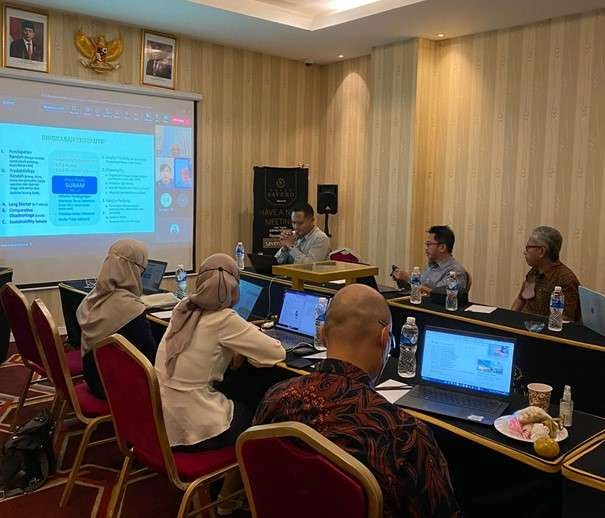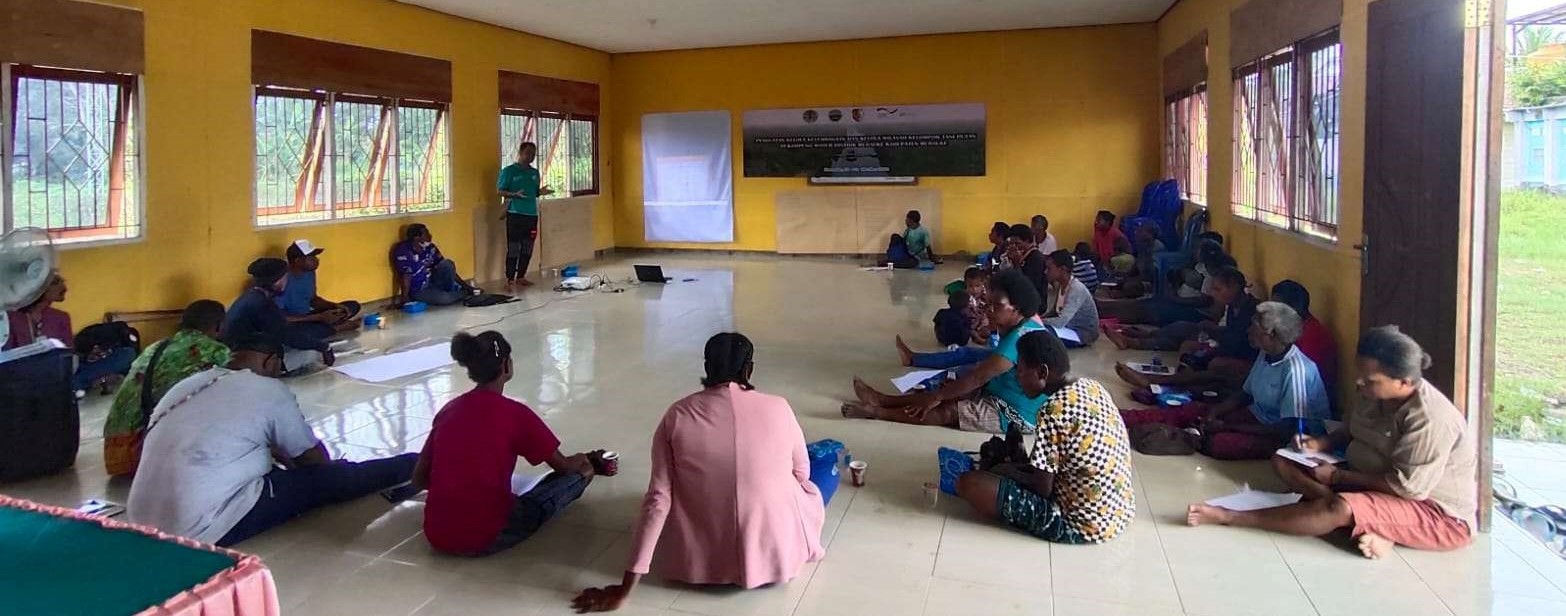FORCLIME
Forests and Climate Change ProgrammeTechnical Cooperation (TC Module)

Select your language
The Irian porcupine or echidna (Zaglossus bruijnii) is a wild animal that is endemic to Papua and that has been categorized as a vulnerable species by the IUCN (International Union for the Conservation of Nature and Natural Resources), an international organization working in the field of nature conservation and the sustainable use of natural resources. The echidna is a monotreme or egg-laying mammal. However, during its various monitoring activities, the West Papua Natural Resources Conservation Agency (BBKSDA) has never managed to locate this animal, so its whereabouts cannot be ascertained with any certainty. Moreover, this rare species is believed to be in decline and is thus a vital subject for research.
In this regard, West Papua BBKSDA, supported by FORCLIME, conducted an Echidna survey in the BBKSDA working area of the Beriat Natural Tourism Park (TWA) from 17 October to 1 November 2022. The survey locations focused on three villages around the Beriat TWA area, namely Srer, Aibobor and Wehali, while the survey itself involved both interviews and direct observations.
Prior to conducting the survey, the personnel involved in the Echidna survey activities were first given rele-vant training. The training aimed to increase knowledge and skills as regards the inventorying of the Irian porcupine through direct observations and social surveys. Training for the Echidna identification survey was held from 14 to 16 October 2022 and involved the following participants:
- Six West Papua BBKSDA staff members.
- Four FORCLIME interns.
- One FORCLIME staff member.
- 10 participants from three survey location villages.
- Two participants from the University of Papua (Faculty of Teaching and Education and Diploma 3 Conservation at the Faculty of Forestry)
During the training, participants were presented with guidelines that addressed the search for the animals that were being surveyed, as well as further guidelines that addressed the conducting of field surveys or social observations and surveys. The observations were carried out through direct observation and trace identification techniques. Meanwhile, the social survey used the direct interview method, particularly with key informants from the relevant villages, for example, village heads, traditional leaders, religious leaders and hedgehog hunters. In addition, to these theoretical inputs, the training participants also engaged in practice sessions out in the field in Kampung Srer and TWA Beriat.
This activity was followed up with an analysis of the generated survey data, which has now been incorporated into a report. The results of the echidna survey will ultimately be used as a reference, not only by researchers but also by other stakeholders.
For more information, please contact:
Nita Yohana, Adviser for Sustainable Forest Management and Coordinator for West Papua Province
Mohammad Sidiq, Strategic Area Manager for Sustainable Forest Management and Coordinator for Papua and West Papua Provinces

Continuing from initial discussions that addressed the study of forest bioeconomy in Indonesia, Bappenas recently held a series of FGDs aimed at securing views and input from stakeholders regarding bioeconomy potential. One of these discussions was held with industry players and specifically addressed the processing of forest products. FORCLIME facilitated this discussion with industry experts, which was held on 1 November 2022 in Bogor as well as online.
The meeting was opened by Dr. Nur Hygiawati Rahayu, ST, MSc, the Director of Forestry and Water Resources Conservation for Bappenas before continuing with a presentation given by a number of experts from the Bandung Institute of Technology, who introduced the underlying objectives and scope of the study. Speakers at this meeting included representatives from Perum Perhutani (a state-owned timber company), the Association of Indonesian Rubber Companies and PT Riau Andalan Pulp & Paper.
Several important points were made by the speakers in relation to the performance of the processing industry and the various commodities that it manages, including pine resin, eucalyptus, rubber and derivative products that are or that will be developed. Several key challenges were also addressed by the speakers, including a lack of competition between their products and imported raw materials, as well as the fact that their exports are less competitive than products from other countries. In terms of rubber specifically, 90% of rubber plantations remain dominated by smallholder plantations and, as a result of urgent need, farmers often do not want to endure the long wait required in terms of the planting of rubber plantations. This in turn leads to less productive plantations, a problem that is exacerbated by the low price of natural rubber which causes farmers to lean towards the development of other commodities. As a result, support from the government will be required to maintain the continuity of production from farmers.
One important message that emerged during the discussion and that will ultimately be followed up on is the importance of developing derivative products to boost the performance of the forest product industry and support bioeconomic development. In addition, it is necessary to identify the root cause of each commodity from upstream to downstream and viable solution strategies, as well as generate an analysis of the most profitable commodity through optimal processing from an economic standpoint. Product clustering is also vital in terms of determinations of potential product developments across each region of Indonesia, both on a small and large scale.
For more information, please contact:
Nurdita Rahmadani, Junior Advisor for Monitoring, Evaluation and Reporting
Pipin Permadi, Senior Advisor and Liaison Officer
Wandojo Siswanto, Strategic Area Manager for Forest Policy and Climate Change

Forest farmers’ groups in Wasur and Yanggandur Villages utilize and manage non-timber forest products (NTFPs) in traditional areas of the National Park of Wasur. To strengthen institutional and area management in each village, the Wasur National Park, supported by FORCLIME, has been conducting training sessions for members of these forest farmers’ groups with the goal that each group member should be able to understand their roles and responsibilities as regards support for NTFP management activities. The training sessions also offered knowledge relating to the establishment of communications between members so that group organization will be able to improve in the future. In addition, training participants also gained knowledge relating to group administration, specifically mutually agreed group rules and the distribution of business results.
Moreover, in terms of area management, participants were presented with knowledge relating to area management and the sustainable use of NTFPs. In addition, because they are active in the Wasur National Park area, the participants also received input relating to the zoning of the conservation area and the communities that engage in activities within the traditional zone. The training sessions also discussed the value of the local wisdom that can be applied during the management of areas. For example, the system that is used to open and close areas, which is known as Sasi, comprises a local legal system that contains various prohibitions and obligations relating to the picking or taking of potential natural resources of certain types during certain periods. Valuable local wisdom such as this can be applied as part of efforts to protect the Wasur National Park.
During the training sessions, participants practiced making a sketch map of the group's working area in relation to the products that they produce. Meanwhile, in terms of the sustainable use of natural resources, participants gained knowledge of sustainable use practices, such as rotating the sourcing of eucalyptus oil leaves, as well as the importance of not felling eucalyptus trees and not picking eucalyptus leaves from a single tree.
The capacity-building training for members of forest farmers’ groups of Yanggandur Village was held from 17 - 18 October 2022 at the Yanggandur Village Hall. Meanwhile, the training in Wasur Village was conducted from 20 - 21 October 2022 at the Wasur Village Hall.
As a follow-up to the training sessions, all forest farmers’ groups have been required to complete various organizational and administrative forms. In addition, each group also has to complete their management area sketch map.
For more information, please contact:
Theodora F. Resubun, Advisor for Sustainable Forest Management and Coordinator for Papua Province
Mohammad Sidiq, Strategic Area Manager for Sustainable Forest Management and Coordinator for Papua and West Papua Provinces


